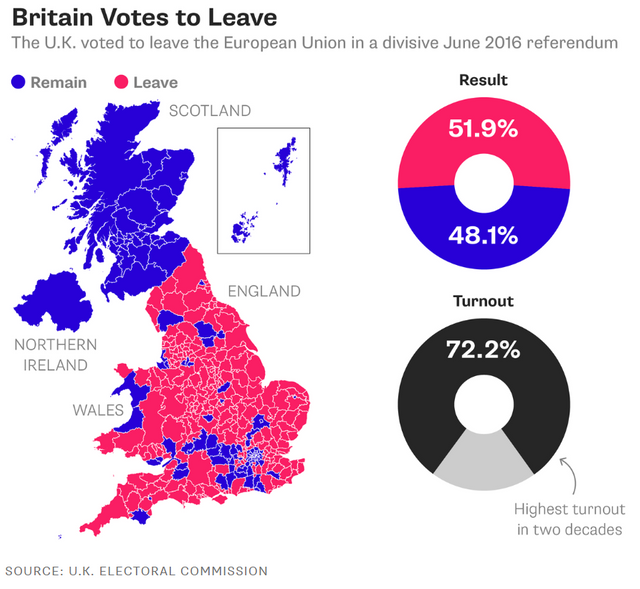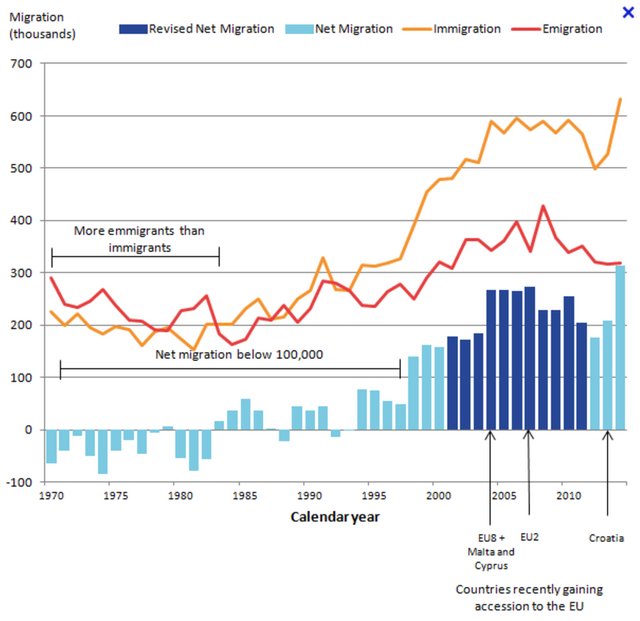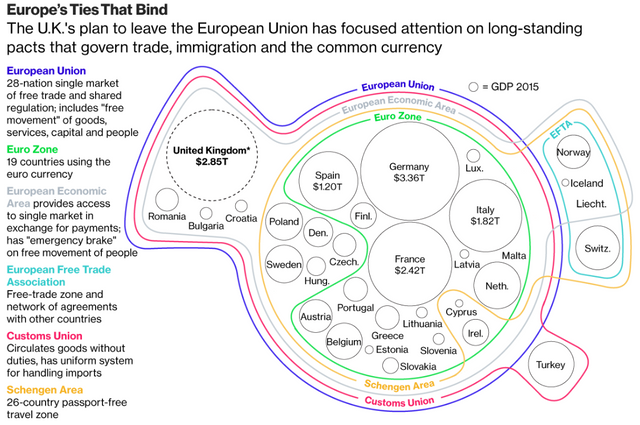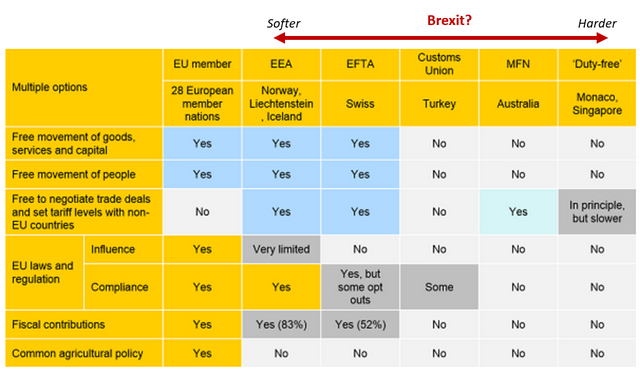Brexit explained.
I followed briefly the Brexit situation this year but never really took the time to understand all its implication and what all this political, legal and economical talk was all about. So here is a little article I wrote for myself that tries to digest all the information necessary to have a clear understanding of what Brexit is.
A little context
To rewind a little bit we first need to address the creation of the European Union (E.U.). Countries usually band together to promote trade, defend human rights, protect the environment and repel threats. They sign treaties and join international groups, and each time they do, they give up a bit of independence. That happened in a big way with the creation of the E.U., a free-trade zone and global political force formed from the different states of Europe. The question always was, could this extraordinary experiment hold together? Well, this question has been partly answered by the people of the United Kingdom in a June (2016) referendum, shocking the world by voting to leave the bloc they had joined in 1973. The way many Britons saw it, the E.U. was expensive, out of touch and a source of uncontrolled immigration. They chose what's become known as Brexit.
A little recap
The exit of the U.K. from the E.U. was supported by a split of 52% to 48%. Prime Minister David Cameron, who had pushed for the U.K. to remain in the E.U., resigned and was replaced by the conservative Theresa May.

As you know, the vote caused a little havoc in the financial markets, sending the British Pound tumbling on the prospect of years of uncertainly about how Brexit will work. The uncertainty is due to the fact that no country in the E.U. has ever exited the union and the result and implication of this process remain unknown today. Britain will have two years to negotiate the terms of its separation once it takes the legal steps to leave the union and Theresa May said she will trigger the start of the negotiation period before end of Q1 2017. This means by Q1 of 2019, theoretically, the U.K. would be out of the E.U.
The argument for leaving the E.U.
The Brexit supporters, the so-called Eurosceptic, argue that because of the E.U. laws, which include the so-called 4 freedoms (free flow of capital, goods, services, and people), the U.K. has to accept immigrants into their territory. The same Euroscepticism kept Britain from adopting the single currency when it was launched in 1999. The E.U. added 8 eastern European countries in 2004, triggering a wave of immigration that strained public services. In England and Wales, the share of foreign-born residents swelled to 13.4% of the population by 2011, roughly double the level in 1991.
In recent years, migrants have been attracted by Britain's economy, which had been growing at twice the pace of the euro zone. Because the free movement of citizens is a basic tenet of E.U. law, leaving the bloc is the only sure way to prevent the flow of people. The U.K. is the second-biggest E.U. country by economic output and the third-largest by population, after Germany and France and there's still a queue of countries waiting to join the bloc.

Additionally, given that most E.U. legislation needs a weighted majority of nations to approve it, Brexit supporters complain that the U.K. is often in the minority and so often must implement European laws it doesn’t agree with (according to LSE politics researchers, Britain was in the losing minority far more than any other country in 2009-2015).
These same Eurosceptic believe that the U.K. has global influence and power without the E.U. and they claim that the country can negotiate better treaties on its own. The question now is whether the U.K. can strike a Brexit deal with Europe that gives it control over immigration and also retains access to the E.U.'s tariff-free single market of 500 million people, the economic backbone of the world's largest trading bloc.
Though, there is a risk that the more integrationist member states seek to make an example of the U.K. to discourage other potential leavers… German Chancellor Angela Merkel and other E.U. leaders want to prevent the E.U. from rupturing further. They insist the U.K. can't expect market access without the free movement of people. The trade deals struck by Norway and Switzerland (2 countries that have never been part of the E.U.) may provide a guide, though the U.K. is a larger economy and more intertwined.

So what’s this fuss about the trade implication if the U.K. leaves the E.U.?
Just when you finally grasped the meaning of “Brexit,” the subject grows more complicated…
As political leaders from London and E.U. are negotiating U.K’s exit, 2 broad options are being discussed and are referred to as “hard” Brexit and “soft” Brexit. Theresa May is leaning toward a “hard” Brexit”.
Hard Brexit
This leans toward the idea that the U.K. would be giving up its membership in Europe’s single market for goods and services in return for gaining full control over its own budget, its own law-making, and most importantly, its own immigration. If that happens, British leaders will be under pressure to quickly land a new trade pact or individual industry-by-industry deals with the E.U. Otherwise, companies will be subjected to standard World Trade Organization rules, which would impose tariffs on them. Banks would lose the easy access they now enjoy to the bloc.
Soft Brexit
A softer form of an exit would see the U.K. maintain some tariff-free access to the single market. The U.K. would likely still have to contribute to the E.U. budget, allow some freedom of labor movement and follow some E.U. rules. That’s what Norway does, as a member of the European Economic Area but not of the E.U.
Below is a summary table of the current trade negotiation of the E.U. with its different trade partners. Depending on how the U.K negotiates with the E.U., the result of the Brexit could make the U.K appear anywhere on the right of the “E.U. member” column

And to clarify further on what it really means to be a member of the E.U. here is a little summary of its benefits and some terms you may encounter while reading on the topic – this focuses on financial services specifically:
Being a member of the E.U. places the U.K. inside the coverage of the E.U. Treaties, conferring single market access rights, “passporting”, and the assumption of regulatory “equivalence”

Becoming a third country with respect to the EEA, means not having standing to the Court of Justice of the European Union (CJEU), and has significant regulatory consequence with regards both single market access “passporting” rights and regulatory “equivalence”:

Hope this helps
Still Looking For Brexit Insight?
For whatever reason, brexit continues to be a big deal in the narratives of the global mainstream media. However, no one in the MSM (or the alternative media for that matter) seems to be able to render an actual account of why brexit happened and what the result will be going forward.
In the following Twitter thread, you'll find a few brexit insights from the archives of the Exceptional Insights Group, who's analysts have been monitoring the situation in the UK for some time now.
You won't find brexit insights with this level detail (despite my attempt to be as vague as possible) anywhere else, that I can assure you. twitter.com - Mike Hydes on Twitter
Want more detailed insights?
Contact sales@exceptionalinsights.group to setup a transaction.
Congratulations @jurisnaturalist! You have received a personal award!
Click on the badge to view your own Board of Honor on SteemitBoard.
For more information about this award, click here
Congratulations @jurisnaturalist! You have received a personal award!
Click on the badge to view your Board of Honor.
Congratulations @jurisnaturalist! You received a personal award!
You can view your badges on your Steem Board and compare to others on the Steem Ranking
Vote for @Steemitboard as a witness to get one more award and increased upvotes!